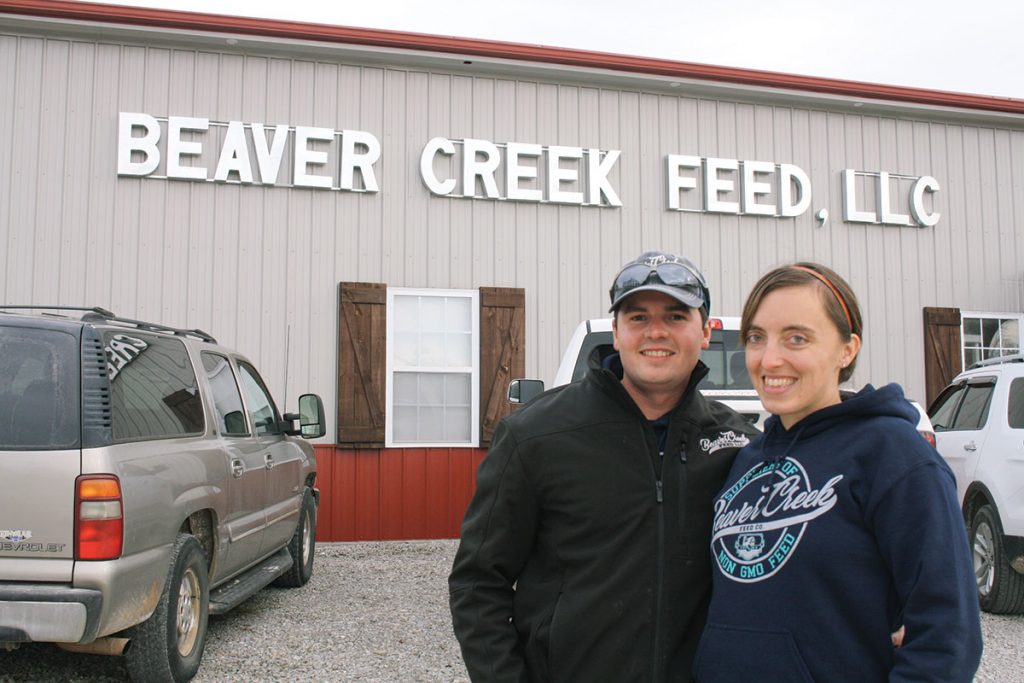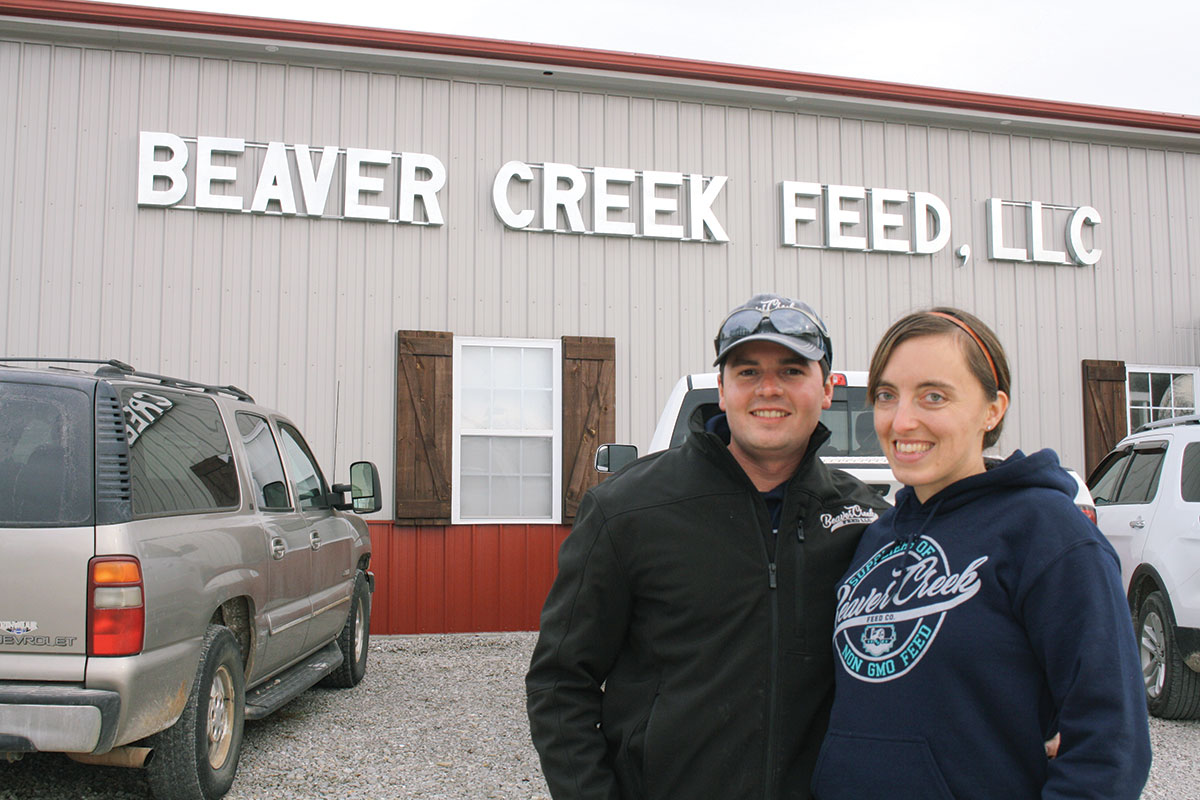
Beaver Creek Feed Company caters to non-GMO producers
While still in high school, Bryson Long began sourcing non-GMO grains for his family’s farming operation in Douglas County, Mo. The venture soon led to the birth of a new business – Beaver Creek Feed Company.
Beaver Creek Feed is a verified non-GMO feed mill outside of Ava, Mo., offering wholesale feeds to retail outlets in Missouri and Arkansas, and bulk delivery to farms as far as three hours away.
“In 2011, I started in a shed on my folks’ farm, grinding feed with an old tractor grinder, and things kind of went from there,” Bryson said. “I was in the custom hay business in my teens, so it’s not much of a switch to move into this. We have some friends in the West Plains area who ground their own feed and they would answer a lot of questions so I thought I would give it a try and see what happens.”
Bryson took a chance on Beaver Creek Feed, a chance that has paid off for the young entrepreneur. Thanks to increased business, Bryson constructed a new facility in 2015 and continues to make operational improvements.
“It’s been a steady incline,” he said. “There’s been years where it’s bumped more than others, but it’s continued to grow steadily. We have an extensive repeat customer base. When people start using our feed, they continue using our feed as long as they’re in business. This was my goal, but you never know.”
Beaver Creek offers complete poultry rations and scratch grains, a swine rations, beef cattle and dairy feed, and a complete rabbit formula. The greatest demand is for poultry and swine feeds.
A non-GMO feed, Bryson said, is like “old-fashioned” feed.
“It’s feed the way it used to be,” he explained. “A GMO means the seed itself has been genetically modified, primarily so it can be sprayed with chemicals like Roundup. We see ourselves as an old-fashioned feed mill; it’s the old-fashioned grain before it was genetically modified. The science of a GMO is a good science, but with those grains being genetically modified, they are subject to many things that go beyond what feed was normally subjected to. Some of the side-affects to livestock and animals is what mostly causes people to go non-GMO.”
All of the grain processed at Beaver Creek is sourced from Missouri non-GMO farmers.
“We’re fortunate in that we have some long-standing relationships with those farmers, and that’s been a blessing,” Bryson said.
In addition to non-GMO grains and feed, Beaver Creek Feed also utilizes non-GMO and organic mineral supplements in their feed. Every load of corn, soybeans and alfalfa received is tested before being mixed into feed. Not all grain, such as oats, is a GMO, so testing is not required. Beaver Creek Feed is inspected annually by the Non-GMO Verified Project.
“It’s all a private verification, so there are no loopholes,” Bryson said. “It’s a guarantee to the customers that they are getting a non-GMO product.”
The state of Missouri also audits feed regularly to ensure it is as labeled.
Beaver Creek Feed closely works with a nutritionist to formulate both bagged and custom mixes, and addresses any needs or concerns a producer may have.
“You can open the bag and see the grains in it. You can pick out the corn, the soybeans, the wheat, the minerals; it’s all there. All of our feed is textured feed, not pelleted. Pelleted feeds are heated, and when it’s heated, it loses a lot of the nutrition.”
Because the grains are not pelletized, some animals are not receptive to the feed.
“In some ways their digestive system has to work a little harder to break it down, but that’s good,” Bryson said. “Their bodies are working a little harder to assimilate it. In the end, it results in a healthier product and still gives the animal what they need. There might be a little drop in production, but then they adjust, and it comes back even better.”
The consumer demand for non-GMO fed meat and eggs has been a contributing factor for Beaver Creek’s success.
“This is really a niche market, and there aren’t many non-GMO mills around,” Bryson said. “Our customers love it and they like the products they feed. They also like a small business where they can call and talk to the owner or that they see the same delivery guy every month on their farm. We have built good relationships with our customers; they take care of us, so we take care of them.”
With growth has come the need for additional help. Bryson and his wife, Camille, and three employees work at Beaver Creek Feed Company. Adding to the workforce allows Beaver Creek to make bulk and bagged deliveries to their retail partner locations.
Old-fashioned feed appeals to breeders of heritage livestock, which is a growing market.
“There’s a huge swing in customers raising heritage breed chickens and hogs,” Bryson said. It’s a heritage feed for a heritage breed. “We have a ration for heritage breed hogs. They don’t need the same mineral as a conventional hog, especially if they have room to roam. They root around and get minerals out of the ground.”
Many consumers have made a swing to a grass-fed and finished product, but Bryson said there is still room for non-GMO products in those operations.
Beaver Creek Feed might be making feed the old-fashioned way but it’s appealing to a new generation of producers.
“It’s the new farmers, and those who are looking at that homestead way of life,” Bryson said, adding that the COVID outbreak increased their production for a few months as more people explored raising their own livestock, especially chickens. “We think some established cattle producers, as cattle prices remain low, will look for a new market, but they are the minority.”
Bryson hopes to continue to grow in the coming years and lays the future in God’s hands.
“It’s his will, and we want to honor him,” Bryson said. “God is so good and has blessed us. We hope to reach more farms and be a blessing to more customers. There are still farmers who would like to know more about non-GMO feeds, and we would like to reach more stores. It takes time to build markets and clientele, so it takes time to get those established.”







